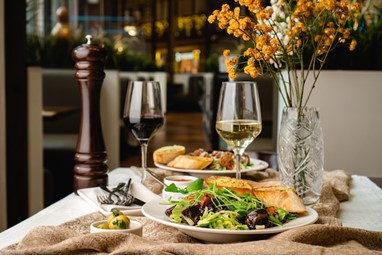

Annalee Knowles is a connoisseur of fine dining. In the world of culinary delight, there exists an art form that transcends the mere act of eating. It’s the symphony of flavors, the dance of aromas, and the marriage of ingredients that elevate a meal to a transcendent experience. In the following article, Annalee Knowles delves into the world of food pairing, exploring how the right combination of flavors can transform an ordinary meal into a culinary masterpiece.
It’s not always as simple as “eat, drink, and be merry.”
If fine dining is an art, food pairing can turn a dining experience into a masterpiece. Get it right, and the result is an unforgettable meal filled with bold and complex flavors.
“Satisfying” is an understatement. Food pairing can be revelatory.
Annalee Knowles Explains More on Food Pairing
Food pairing isn’t just about different items that taste good together. It’s very much a science and an art that enhances textures and aromas. Sometimes, it can come down to how one ingredient is prepared and integrated into a dish. Overall, Annalee Knowles explains that food pairing involves considering combining texture, taste and flavor elements to bring out.
Sound intimidating? Annalee Knowles understands that it may be at first. But food pairing eventually becomes second nature for dedicated cooks — amateur and professional. Ingredients can be combined in different ways to bring out the best aromas and flavor elements of each. In the end, dishes will offer new heights of dimension and depth.
A Roadmap to Effective Food Pairing
Practice makes perfect when experimenting with food pairings — and it’s all part of the fun.
Before settling on a dish to make or a theme for a dinner party, it helps to consider the time of year in order to begin pairing seasonal ingredients. For example, Annalee Knowles notes that summer is a great time to use certain in-season produce with flavors that highly complement each other, such as watermelon, cucumber, and mint.
Annalee Knowles explains that pairing certain foods also begins with deciding on a flavor profile and experimenting with what appear to be opposites. Is a savory sensation the goal? Should there be ingredients that either give a dish an edgy or a softer flavor profile?
Balancing sweet and bitter notes can be challenging at first, but it can ultimately make for a creative and dynamic meal that our 10,000 taste buds will go crazy for.
Such flavor balance is key. For example, if the main dish is rich pasta, a light and crispy side salad will go a long way to achieve a memorable flavor balance, making each element better together but also separately.
Annalee Knowles says that if there is a very rich dessert, a good drink pairing may be a very bold coffee. Food pairing is an adventure that needs to be embraced fully in order to reap the biggest flavor rewards.

 General Food Pairing “Rules”
General Food Pairing “Rules”
Savory and sweet, bold and light, rich and simple — there are always numerous ways to elevate a dining experience through food pairing. Consider this: there are close to 100 descriptors for aromas that can then be further grouped into over a dozen different types ranging from citrus and flora to roasted, woody, and nutty.
Annalee Knowles says that it’s complicated, but there are some basic rules to guide the way. Perhaps the easiest way to dive into food pairing is by creating a complementary pairing (picking a wine that complements a dish) or going for a congruent pairing (drinking a wine that enhances a dish).
There is a difference between these two food pairing concepts. For example, a wine that brings out a cheese’s richness is considered a congruent pairing, while combining a high-acidity wine with a rich cheese dish is a type of complementary pairing.
But, There’s More to Consider…
- Using wine and foods that have similar weights, such as lighter food with lighter wine and heavier food with weightier wine. Annalee Knowles says that another gold rule of thumb is matching food and drink intensities and characters. Light foods like fish will work well with wine that is more citrusy, such as pinot grigios.
- Pair aromas. Certain fruits and vegetables have very similar green and floral aromas, such as asparagus and cherry. However, the taste and textures of each food element need to be considered as well when establishing pairings.
- Experiment, especially with pairings that seem odd or unfamiliar. Chances are that the results will be surprisingly delicious.
Annalee Knowles also notes that certain food pairings can have a good impact on energy levels and may lead to feeling full longer. That full feeling (satiety) is part of the science behind such pairings. High protein foods and foods that are good sources of fiber are usually more satiating than food that’s high in carbohydrates and fat. Pairing stews with certain vegetables and beans with salads are satiating pairings. It’s a culinary approach that not only delights the palate but also nurtures the body.
